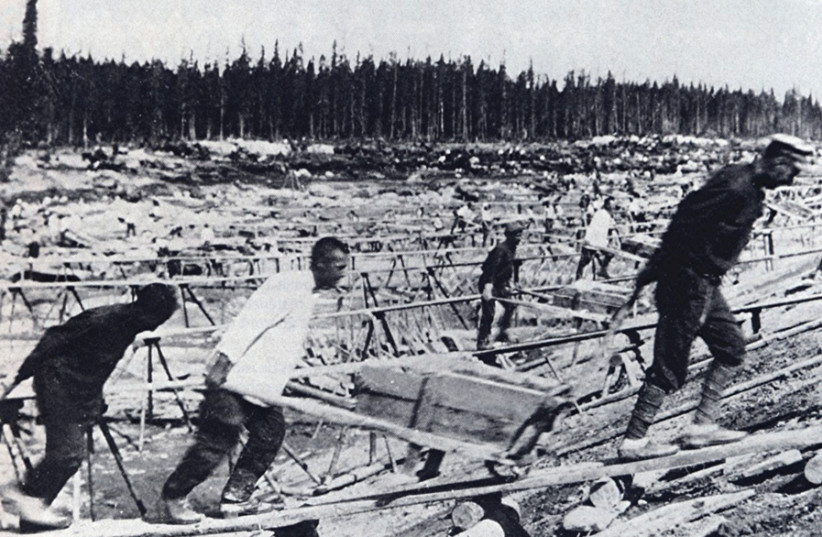Yury Pavlovich Fedorov, who died on September 28, spent nearly two decades in Soviet labor camps, for defending the right of Soviet Jews to immigrate to Israel – except he wasn’t even Jewish.
In June 1970, Fedorov and a small group of co-conspirators planned to seize a small aircraft at a Leningrad airport and to fly it to Sweden – and from there to get to Israel.
Most members of the group were Soviet-Zionist activists who had applied to make aliyah and had been refused. In fact, at the time no one was allowed to leave the Soviet Union – especially not Jews and especially not to Israel, since after the Six Day War Moscow had broken off diplomatic relations.
They had purchased all the tickets for a regional flight, pretending to be guests traveling to a wedding. Their plot failed before they had even started. The KGB swooped in and at the ensuing trial all the participants were convicted of high treason.
The masterminds – Mark Dymshits (who was supposed to fly the plane) and Eduard Kuznetsov – got a death sentence, which under pressure from the international community was commuted to 15 years of hard labor. Fedorov also got a 15-year term. The only other non-Jew in the group, Fedorov’s friend Alexei Murzhenko, a Ukrainian, got 14 years.

Who was Yury Fedorov?
Fedorov had a pretty typical post-World War II Soviet childhood. His father was killed in the war and he was educated at Suvorov Institute, a military boarding school for boys that typically led to a career in the Soviet Army, not to a labor camp for “anti-Soviet activities.” However, in the early 1960s, he moved to Moscow to attend college, where he and a group of friends founded an underground human rights organization.
They were inspired by 19th-century liberal writer and thinker Alexander Herzen, and they named their organization the Union of the Freedom of Thought. They were promptly arrested and Fedorov got his first taste of Soviet prison, serving three years of a five-year sentence.
In the Soviet Union, once you were a dissident, you were always a dissident. After he came out, it was simply a matter of time till the KGB put him back in. So when a Jewish friend and fellow-political prisoner Eduard Kuznetsov shared with him a plan by a group of Jewish refuseniks to escape the Soviet Union, he and Murzhenko readily agreed to take part.
Fedorov always maintained that they knew they had been betrayed, that the KGB was watching them and that they would be taken. Nonetheless, they decided to go through with the plan. Why? Because they wanted the world to know that Soviet Jews were determined to go to Israel and were willing to resort to extreme measures to get permission. According to Kuznetsov, getting arrested on the tarmac made their case even more poignant.
The Soviets changed their policy
And indeed that worked, albeit slowly at first. In 1970, around 1,000 Jews were allowed to emigrate, mainly those who had immediate family in the Jewish state. That became 13,000 a year later and 30,000 in 1972. By the time the Soviet invasion of Afghanistan put an end to the policy of detente and Moscow curbed Jewish emigration once more, over 200,000 Jews had been let go.
Over the years, all the jailed Jewish members of their groups were exchanged for Soviet spies caught in the West and were able to go to Israel. But not Fedorov and Murzhenko, whom the prosecutor had warned would serve their sentences in full – probably in order to make sure that no other non-Jew would ever want to stand up for Jewish causes.
However, according to Fedorov, unstinting support from Israel and international Jewish organizations throughout his entire period of incarceration most likely saved his life. The camp administration would have dearly loved to get rid of this Jew-loving, trouble-making, independent-minded prisoner, but they also realized that if they staged a “work-related accident,” they would have an international incident on their hands and left him alone.
Fedorov spent his last years in quiet seclusion in rural Upstate New York. He established a small foundation to help old Soviet dissidents, many of whom were living out their days in poverty in Vladimir Putin’s Russia. He fed a couple of stray cats who congregated around his house and whom he refused to name, because he respected their freedom and independence, he said.
Yet, even in America he was never too far from the Jews. His small town, Fleischmanns, was named after Charles Fleischmann, a Hungarian Jew who came to America in the 19th century and founded Fleischmann Yeast Co. And, being in New York’s famous Borscht Belt, Fleischmanns is surrounded by resorts serving kosher food and featuring Jewish performers. In recent years, the town has attracted a particularly large Satmar Hassidic community.
The writer was born in the USSR and has lived in the US since 1975, having emigrated on an Israeli visa during the Let My People Go campaign for Soviet Jewry. He has worked as an economist for 35 years, including positions at Standard and Poor’s and The Economist Intelligence Unit. During the past 10 years, he has published four murder mysteries set in Moscow in the 1960s.
